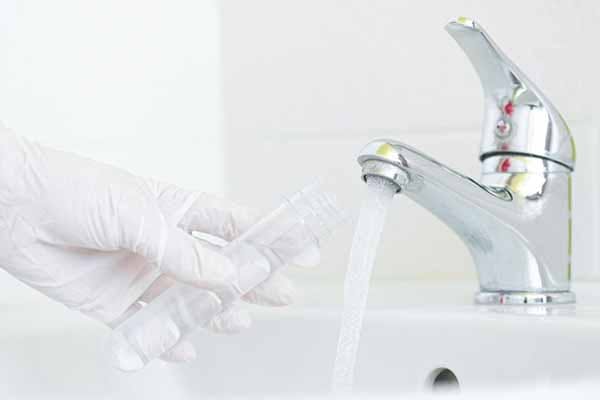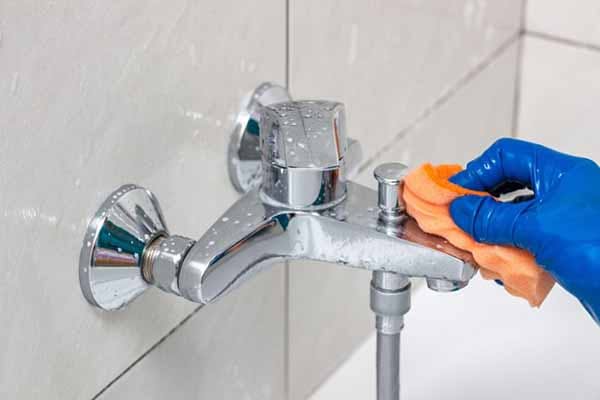August 2022
How to Tell if You Have Hard Water: Signs, Tests, and Solutions
We hear a lot about hard water and soft water, which may leave you wondering how to tell if you have hard water.
What is hard water anyway? And, how do you tell the difference between soft and hard water in your home?
Water hardness is determined by the number of dissolved minerals, specifically magnesium and calcium, in water. According to the United States Geological Survey (USGS), the hardness level of water depends on the concentration of calcium carbonate (milligrams) present in a liter:
- Soft: 0 to 60 mg/L
- Moderately hard: 61 to 120 mg/L
- Hard: 121 to 180 mg/L
- Very hard: 180 + mg/L
Water hardness is a concern to systems that use groundwater. As the water moves through soil and rock, it dissolves minerals so that they seep into the groundwater. Therefore, if there is a high mineral load in the soil surrounding a water supply well, there is a high probability that households in the area will have hard tap water. On the other hand, soft water has low amounts of minerals. Therefore, rainwater and distilled bottled water are usually soft.
In this article, we'll explore how to tell if you have hard water and what to do about it if you do.
link to Month 5 #2: chlorination in city water when published
Does Hard Water Impact My Health?
Hard water can be an essential source of calcium and magnesium for humans.
However, water that is too high in mineral content can be unhealthy. Therefore, it is crucial to establish the quality of your drinking water. A water quality report will tell you everything you need to know about the safety of your water. The Environmental Protection Agency (EPA) requires all water suppliers to provide these reports to their customers. For example, specific chemical, biological, and radiological contaminants in water threaten human health.
What Are the Signs of Hard Water?
Before you have your water tested, a few telltale signs may give you a heads up about your water hardness. Hard water or soft — there are some telltale signs.
Washing Your Hands Leaves a Residue
You can tell if you have hard water simply by washing your hands. If you have hard water, there would be a residue left on your hands after washing with soap. Residuum occurs because the soap reacts with the calcium to form a slimy film known as soap scum.
Conversely, if you have soft water, the soap and water will produce a lather (frothy mass of bubbles).
Your Skin Is Dry and Itchy
Skin issues such as eczema and psoriasis occur more commonly in households with hard water. This is because hard water upsets the delicate skin barrier, causing dry skin, clogged pores, itchy skin, breakouts, and flaking.
Your Hair Is Lackluster
Hard water can create a mineral buildup on your hair and scalp. The result is that your hair loses its shine and appears flat and lifeless. In addition to weighing your hair down, hard water can also leave your hair dry and brittle and thus prone to breakage.
Think you have hard water? Explore the best water filter pitchers.
There Are Spots on Your Dishes
Apart from the residue left on your hands, hard water also leaves a residue on your dishes and glassware. If you notice spots or murkiness on your glasses after being washed, it is a sign that you have a hard water problem.
Your Clothes Feel Rough and Stiff
When you do laundry with hard water, the mineral deposits will stick to the fabric, making your clothes feel rough and stiff instead of soft. You might also notice color changes or fading on your clothes, such as whites turning yellow or gray. The mineral deposits will also weaken the fibers in the fabric, causing your clothes to tear easily.
There Is Buildup in Your Shower
You may notice a filmy residue on your glass shower door and tiles — that is evidence of hard water. Once the water from your shower dries, mineral deposits are left behind, causing your once-shiny, clear shower doors and fixtures to be covered in water stains.
You Have Frequent Plumbing Problems
Hard water leads to mineral buildup in your pipes, fixtures, and appliances, which results in corrosion and water pressure issues. For example, you might notice that your showerheads and faucets get clogged and do not have the same water flow they used to. Hard water may also compromise the performance of your washing machine.
Your Water Bills Go Up
Scale buildup will hamper the performance of your boiler and water heater. In addition, because water will take longer to heat up, it will use more energy and thus increase your utility bills.

How Is Water Hardness Tested?
There are many ways to test whether you have hard water. Here are the most common methods:
Measure the Suds in a Soap Water Solution
If you suspect that you might have hard water, there is an easy way to test your water at home. Add some dish soap to a container with water, and shake it. If the solution does not produce a lot of suds (foam), you likely have a hard water problem.
Do a Visual Check
See how your water reacts to anything it touches. For example, you will see a crusty scale develop around your faucets and sinks if you have water hardness.
Study Your Local Water Testing Report
However, there is also a formal route for determining your home water hardness. First, you can contact your water provider to ask them for a recent water testing report. This report will include a list of the tested contaminants and their concentrations present in your water.
The units used to measure the contaminant levels are part per million (ppm) for metals and nitrates and parts per billion (ppb) for harmful substances such as pesticides. Reports will also indicate pH levels, hardness, conductance, and turbidity. Water hardness is also measured in grains per gallon (gpg).
Have a Water Sample Tested
You can also hire a company to do an on-site water test or have a sample tested at a local laboratory.
Use a Water Hardness Test Kit
You also have the option of going with a water test kit. These kits include a test strip with a chemically treated pad that reacts with ions in the water and changes color. You'll compare the color on the strip to a printed color chart. Each color on the graph represents a concentration reading, which shows the concentration of minerals in your home water.
Use a Water Hardness Measuring Instrument
You can also measure your water hardness with a colorimeter. A colorimeter determines color based on the red, blue, and green components of light absorbed by the sample. When light passes through a medium, part of the light is absorbed; thus, there is a decrease in how much light is reflected. The absorption of light transmitted through is directly proportional to the concentration of the medium.

How Can I Solve the Problem of Water Hardness?
There are numerous ways to solve your hard water problem at home. From eliminating the hardness to repairing the unsightly results, here are just a few DIY fixes:
Boil Your Water
If you want to purify your hard water for drinking purposes, you can simply boil it and let it cool down. The minerals will sink to the bottom, leaving purified water at the top.
Use Vinegar Rinses for Appliances
An easy way to descale your appliances is by using vinegar rinses. The acidity of vinegar dissolves the solid calcium deposits.
Apply a Lime or Calcium Removing Spray
You can use a commercial spray to remove stubborn residue from your bathtub, shower, and sinks. Combining lime juice, vinegar, and baking soda also works well. After applying the mixture, rinse the surface with water and wipe it with a clean, dry cloth.
Install a Water Filter
You can attach a water filter to your faucet to purify your water. Some say soft water tastes better than hard water, so many people prefer a water filtration system. You might also consider installing a filter in your shower to protect your skin and hair from the effects of hard water.
Choose Soothing Products
Using soothing hair, scalp, and skin treatments can help you avoid the harsh impact of water minerals. If you live in an area plagued by hard water, it is also advisable to stay away from products containing sulfates as they dry your hair and react negatively with the minerals in your water.
Using a Water Softener
You can treat the problem of hard water by installing a whole-house water softener system. Water softeners work by removing the magnesium and calcium in your water supply through ion exchange. There are two types of ion exchange water softeners:
Sodium chloride: Small amounts of sodium (salt) are added to your water. This is the most effective ion exchange softener.
Potassium chloride: The best alternative for those who cannot have sodium. However, note that potassium can be problematic for people with kidney problems.
Suppose you would prefer not to have sodium or potassium added to your water. In that case, you can install a reverse osmosis (RO) filter to remove these substances after softening the water. Your plumber may be able to advise you on your water treatment options.
Water softeners have various benefits, including:
- Improving the efficiency of your heating systems
- Protecting sensitive skin from the effects of hard water
- Reducing the amount of cleaning product needed
- Extending the lifespan of your appliances
- Increasing the performance and energy efficiency of your appliances
Which Areas in the U.S. Have Hard Water?
About 85% of the water in the U.S. is hard. The following cities/metros have very hard water:
- Indianapolis, IN
- Las Vegas, NV
- Minneapolis, MN
- Phoenix, AZ
- San Antonio, TX
- Tampa, FL
Only 15% of the U.S. has naturally occurring soft water. These regions include:
- Pacific Northwest
- Southeast (partly)
- Gulf States
- New England
Hard water is a common problem in American households. With such a large proportion of hard water around the country, many people struggle with plumbing issues, unpleasant residues, and higher utility bills. Hard water also has adverse effects on our skin, hair, and clothing.
How to Tell if You Have Hard Water: The Solutions
Fortunately, there are various testing options available for how to tell if you have hard water. If you discover that your water is high in calcium and magnesium, there are simple solutions to the problem, including using whole-home water filters, under sink filters, and water softeners.
Wondering about the best solution for your home water situation? Reach out today and one of our specialists can help.
Brought to you by homewater.com
All images licensed from Adobe Stock.
Featured Image